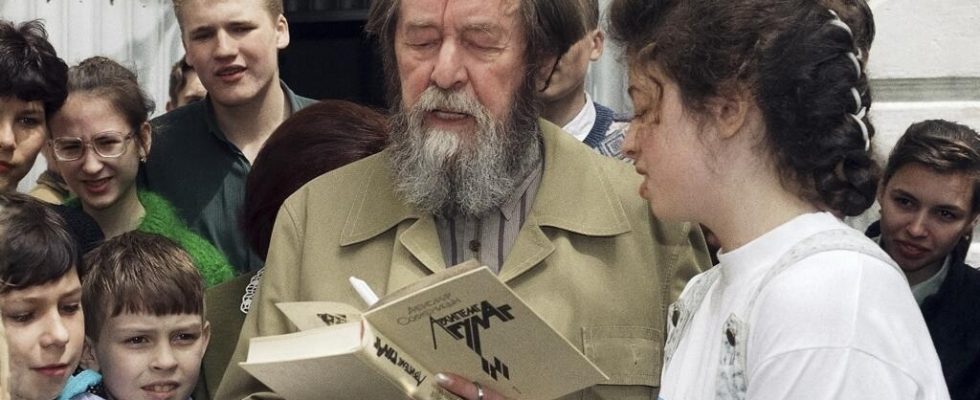On December 28, 1973, appeared in Paris The Gulag Archipelago by Alexander Solzhenitsyn, a book that would cause a global cataclysm. The work, prepared in the greatest secrecy, transmitted clandestinely to the West and published by a publishing house founded by Russian exiles, revealed the Soviet concentration camp system to the world.
4 mins
The monumental work of the man who experienced the gulag helped open the eyes of Westerners to the world of deportation in the USSR. The first volume, first published in Russian, will be sold in many languages. The French discovered the first pages in The Express in January 1974. A month later, Alexander Solzhenitsyn (1918-2008) was arrested by the KGB, stripped of his Soviet citizenship and deported to the West.
Alain Blum, vice-president of Mémorial France, remembers at the microphone Sylvie Noel for RFI of Moscow’s reactions to the release of this book: “ A whole press campaign was launched, supported among others by the French Communist Party. A very violent campaign which uses this publication as, basically, a tool of the Americans or the French within the framework of the Cold War. »
“Ohad already spoken about the concentration camp system » Soviet before The Gulag Archipelago, recalls the historian. But with this book, the world discovers “ a system of government, a system of control of the country, and not just one strong repression among others “. The professor at the School of Advanced Studies in Social Sciences (EHESS) adds: “ This piece had a very strong response. »
Also to discoverGulag: the Europeans speak
Solzhenitsyn, dissident impossible to muzzle
Historians emphasize the essential place of The Gulag Archipelago in demolishing certain myths surrounding the Soviet Union. In Russia, where the author returned to live after the fall of communism, his reading is included in high school students’ curricula, despite the attempts by a member of the presidential majority to have it removed.
Alain Blum notes that after the publication of this work, the Soviet authorities drastically strengthened surveillance of dissident circles. He pursues : ” There was a very violent campaign against Alexander Solzhenitsyn. For example, there was an open letter from a number of writers against him, saying that he was a traitor to the Soviet Union. The authorities hesitated between expelling him, and therefore giving him a voice outside, or keeping him in the Soviet Union. We might as well expel him, since people would be talking about him in the West anyway. »
“ In the feeling of my heart there is no room for a Russian-Ukrainian conflict, and if, God forbid, we come to that end, I can say, never, under any circumstances, will I I myself will go to participate in a Russian-Ukrainian clash, nor will I let my sons take part in it, no matter how hard the demented heads try to drag us into it », wrote Alexander Solzhenitsyn in 1981. These words have been displayed, since the first days of the war in Ukraine, on the window of the bookstore of the Éditeurs Réunés, the establishment which saw the birth The Gulag Archipelagoin Paris.
Read alsoAlexander Solzhenitsyn, the eternal Russian rebel
These “invisibles” who helped exfiltrate the manuscript
The Gulag Archipelago, it is also the story of an incredible publication by Les Éditeurs reunions, a small bookstore in the Latin quarter of Paris, of which many still exist. Behind the window, we see a box containing Cyrillic printing characters. Highlighted on the right, one of the very first printed copies, red and white cover, from The Gulag Archipelago. It was published right here, in this Russian bookstore, just 50 years ago.
A little further on, a black and white photograph is displayed in which we recognize its author, Alexander Solzhenitsyn, right next to the man who worked in the shadows for the publication of the manuscript: the editor Nikita Struve. He was the director of this bookstore Les Éditeurs reunites and of the YMCA Press editions, which it still houses today.
The manuscript was entrusted to the publisher in the form of “microfilms” in 1970, copies transmitted clandestinely by those whom Solzhenitsyn called the “invisibles”, these accomplices who helped him exfiltrate his manuscript to the West. The publisher will compose the proofs in the greatest secrecy.
From January 23, 2024, an exhibition dedicated to the history of its publication will be held on the first floor of the bookstore. On its front, the installation of a plaque commemorating the date of its publication is planned in the coming months.
